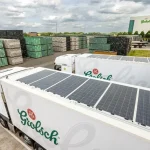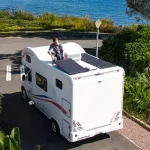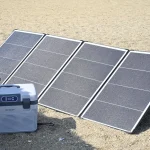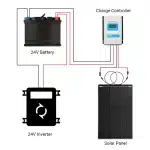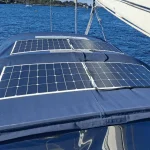As campervans become an increasingly popular choice for travel enthusiasts seeking both mobility and sustainability, harnessing solar energy has emerged as a key element in creating a self-sufficient and eco-friendly home on wheels. When it comes to efficiently managing the energy harvested from solar panels, choosing the right solar charge controller is paramount. Both PWM and MPPT solar charge controller are devices widely used to charge batteries using energy generated by solar panels in campers, boats, and stationary units.
The PWM controller is a switch that connects the solar panel to the battery. This device can significantly reduce the session voltage until it reaches the voltage of the battery bank.
On the other hand, an MPPT solar charge controller is more complex (and more expensive): it regulates the input voltage to get the maximum possible power from the solar panel.
It then converts that power to meet the battery voltage requirements.The MPPT decouples the voltage of the panel from the voltage of the battery, so that a 12-volt battery can be connected in series with the panel to produce 36 volts.
It is widely recognized that MPPT solar charge controller outperform PWM-type controllers in cold temperate climates. In contrast, both controllers exhibit equal performance in subtropical and tropical climates.
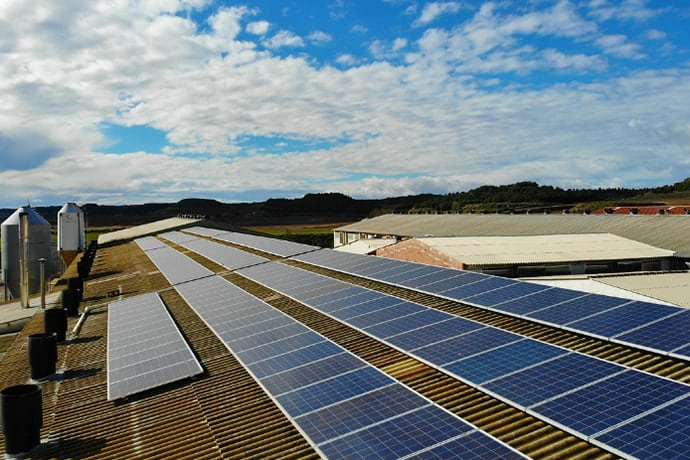
Understanding PWM Solar Charge Controller
A PWM solar charge controller, or Pulse Width Modulation controller, is a simple and cost-effective device designed to regulate the charge from solar panels to the battery. It operates by periodically interrupting the flow of energy to maintain a consistent voltage. While suitable for basic setups, PWM solar charge controller have limitations, especially in scenarios where the solar panel voltage significantly exceeds the battery voltage.
MPPT Solar Charge Controller: Unleashing Efficiency
On the other hand, MPPT solar charge controller (Maximum Power Point Tracking) are renowned for their advanced capabilities in optimizing energy harvest. These controllers continually track and adjust the solar panel’s voltage and current to find the optimal power point where the panel generates the maximum output. This technology is especially valuable in situations where the panel’s voltage is higher than the battery voltage.
Temperature: The Hidden Player
Temperature plays a crucial role in the performance of both PWM and MPPT solar charge controller, particularly in campervan setups where conditions can vary drastically. To better understand the effects of temperature on charge controllers, let’s use the Sungold 100W solar panel as an example. At an ambient temperature of 25°C, this panel delivers a nominal output of 18 volts.
MPPT’s Dance with Temperature
When the cell temperature rises to 75°C, the MPPT regulator faces a challenge in adapting to the changing voltage parameters. At this temperature, the maximum voltage of the same panel plummets to 13.5 volts, significantly lower than the 18 volts at 25°C. This illustrates the importance of accounting for temperature fluctuations when determining the efficiency of MPPT controllers, especially in campervans exposed to varying climates.
PV Panel Temperature 100°C
Pushing the temperature limits to 100°C, we witness a scenario where the panel’s maximum supply voltage drops further to 11.7 volts. Interestingly, many MPPT solar charge controllers are not equipped to convert lower voltages into higher ones. Consequently, they function more like PWM controllers in this situation, directly connecting the panel to the battery. As a result, the charging current diminishes significantly, leaving your campervan’s power system less efficient.
So is MPPT always better than PWM?
We found that at 25°C, an MPPT controller is superior to a PWM controller because it can draw more current from the same PV panel. However, temperature strongly affects the panel output voltage and this is where it gets more interesting.
Temperature is an important parameter that cannot be ignored in any PV system, and this is especially true for trailers. These vehicles move and cannot rely on the static calculations typical of fixed systems.
Mitigating High-Temperature Issues
PWM and MPPT solar charge controller cannot operate at high temperatures.
The solution to improve the performance of the MPPT solar charge controller at high temperatures is to increase the plate voltage by increasing the number of cells in series. This solution does not apply to the PWM controller because increasing the number of cells in series decreases the low temperature performance.
So, for example, just as we use MPPT controllers in trucks, we use 24V PV panels instead of 12V, or what those who don’t have a lot of space can do is to use two 50W panels in series to get the previous 100 This doubles the output voltage, and even with a battery temperature of 100°C, the MPPT controller will be able to charge a 12V battery with 66W (5.1A at 13V) of power to charge a 12V battery.
Another benefit: as the plate voltage is doubled, the plate current is reduced. Therefore, the lower the resistance, the less we end up with.
Conclusion: Temperature-Conscious Choice
When it comes to selecting the best solar charge controller for your campervan, it’s imperative to consider the temperature-related effects on both PWM and MPPT controllers. While MPPT controllers are often touted as the superior choice, their performance is closely intertwined with temperature variations.
For our campervan, the PWM charge regulator is a low-cost solution that only needs to be considered if you are using the vehicle in the hottest conditions, and most importantly, if you don’t intend to park in a shaded area.
On the other hand, MPPT solar charge controller are the right choice for all-around occasions or the more general and less targeted use of a campervan. Therefore, there is no doubt that MPPT solar charge controllers are the best choice when you need maximum freedom of movement.
Understanding these dynamics allows campervan owners to make informed decisions, ensuring the energy harvested from solar panels remains efficient and consistent regardless of the climate conditions. So, as you embark on your campervan adventure, remember that the best solar charge controller choice is one that harmonizes with the temperature extremes you’ll encounter on your journey.
Article courtesy of Sungold
Learn more about solar energy advice at: https://www.sungoldsolar.com/


